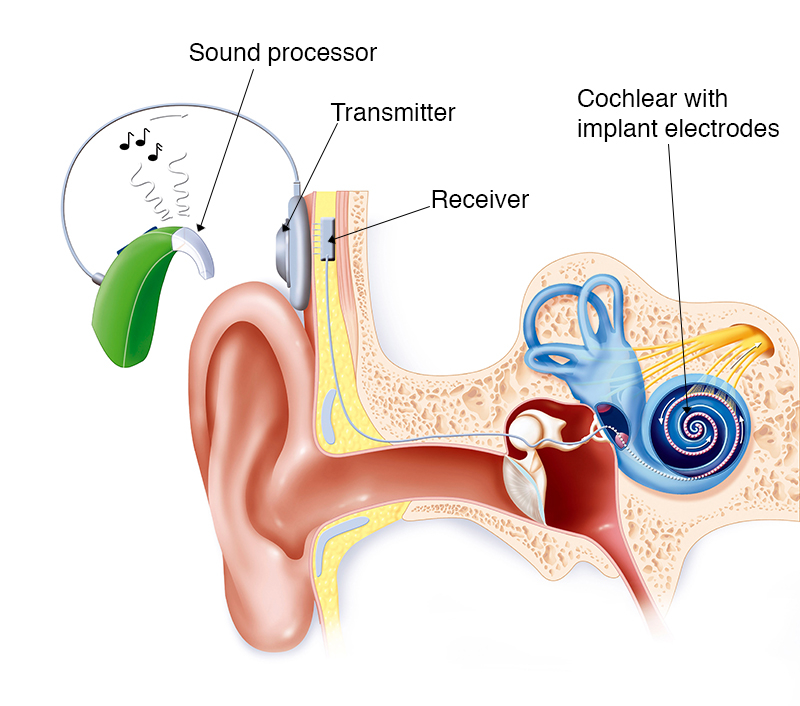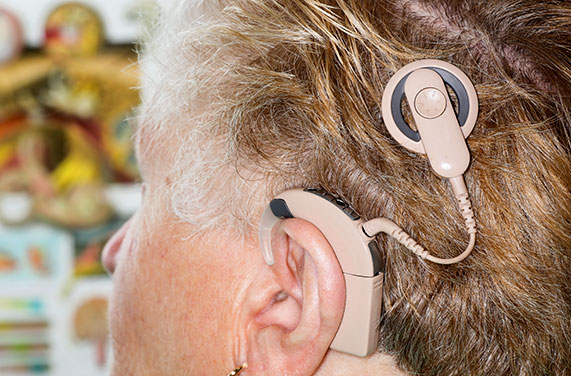Cochlear Implant Surgery

Cochlear implants are gadgets powered by electricity that lessen the effects of hearing impairment. They do not reinstate the faculty of hearing but enhance your aptitude to comprehend speech and detect more audible frequencies. Generally, those who undergo cochlear implantation therapy can derive significant advantages from audiologic therapy, which assists them in regaining the capacity to hear.

What is a cochlear implant?
Cochlear implants are intricate medical devices that operate in a distinct manner from hearing aids. Instead of enhancing sound, which benefits someone with remaining hearing capabilities, a cochlear implant generates the sensation of sound by directly activating the auditory nerve.
Although cochlear implants do not heal or recover hearing loss, they do offer a chance for those with profound hearing impairments or deafness to experience the feeling of hearing by circumventing the harmed inner ear.
Surgical implantation is necessary for them as opposed to hearing aids.
How does a cochlear implant work?
There are two components of the cochlear implant: one that is external and the other that is internal.
The outer component, resembling a hearing aid, is a sound processor which is placed behind the ear and operates using batteries. It is equipped with tiny microphones to detect sounds and transfer them internally via the skin to the implant.
The implant is a surgical attachment that receives signals from a sound processor and stimulates the nerve fibers in your inner ear. These nerve signals then travel to your brain where they are interpreted as sound.
What are the benefits of a cochlear implant?
Having a significant hearing difficulty can have a transformative impact on one’s life. However, the outcomes vary between individuals. Certain individuals experience more advantages than others. Some of the advantages:
- It is possible for you to hear speech almost as well as someone with normal hearing.
- It is possible for you to comprehend spoken words without relying on lip reading.
- Hearing the TV while talking on the phone is a simpler task.
- It is possible that your ability to perceive music has improved.
- You have the ability to perceive various sound levels such as gentle, moderate, or intense sounds.
- Improving your ability to manage your own voice can assist others in comprehending your speech more smoothly.

What are the examinations conducted prior to undergoing a cochlear implant procedure?
Your hearing team may do the following:
- An audiologist can perform hearing assessments to determine the degree of hearing impairment, which can determine whether you can hear sounds or comprehend speech with or without hearing aids. The hearing examination may entail auditory brainstem response testing, which investigates the association between your inner ear and your brain. This exam is employed by audiologists to evaluate children’s hearing and individuals who cannot complete pure-tone hearing tests.
- The vestibular test battery is a method of assessing the health of your inner ear, which is responsible for maintaining balance. These tests specifically focus on the inner ear and are helpful in evaluating its functioning.
- Healthcare professionals may utilize imaging tests such as a magnetic resonance imaging (MRI) or computed tomography (CT) scan to assess the structure of your inner ear.
During the surgery for a cochlear implant, what occurs?
Cochlear implant surgery occurs at a medical facility, either a hospital or clinic, and typically has a duration of two hours. During the surgery, patients are administered general anesthesia to render them unconscious.
- The surgeon cuts a tiny opening at the back of the ear and then constructs a pathway in the mastoid bone for the electrode to reach the cochlea.
- Electrodes for the implant are inserted into the inner ear called cochlea.
- The surgeon positions a device called an internal processor in a space situated between the bone and muscle behind the ear. The internal processor collects data from an external speech processor which is attached outside the skin.
- After the cuts are sealed, the individual is transferred to a place for recuperation and carefully monitored as they regain consciousness from the sedation.
After being closely monitored for a number of hours, the patient is free to leave and return home for some rest. Following surgery, the implant will cause a noticeable change in hearing on the affected side of the body, but adjustments to the device will be made a few weeks later to allow time for the incisions to fully heal. During this period, usage of hearing aids on the surgically treated ear is not recommended.

Recovery After Cochlear Implant Surgery
You will be provided with guidance on how to tend to the incisions prior to departing from the hospital or surgical center. This advice may include:
- Instructions On Changing Bandages and Caring For Wounds
- The time to recommence washing the area surrounding the incision is typically one or two days following the surgical procedure.
After the surgical procedure, the surgeon will examine the cuts and take out any stitches during a subsequent appointment that is usually scheduled around one week later. It is generally advised to delay the use of the cochlear implant for a period of three to four weeks to allow the wound to recover.
After the procedure, it is important to inform the doctor if there is an escalation in pain, swelling, drainage, or fever.
Living with a cochlear implant
The device will be permanently implanted, so you will have to collaborate with audiologists and surgeons throughout your life. You will need to attend routine check-ups to ensure that the audiology team verifies:
- Your device is working well.
- The parameters on your device are operating optimally.
- The region of the magnet on your skin is in good condition.
The cochlear implant has the potential to significantly alter one’s life. Despite the benefits of enhanced auditory abilities, there are still obstacles to be navigated such as:
- Undergoing medical check-ups and therapies may have limitations, as some treatments like ionic radiation therapy, electrical surgery, and neurostimulation may not be viable options.
- Engaging in sports that involve physical contact could result in your implant becoming dislodged from its position due to an impact.
What are the steps I need to follow to maintain my cochlear implant?
There are certain actions that you can take to care for your implant.
- To prevent damage, it is important to keep the sound processor dry since it is not waterproof. Consequently, if you plan on swimming, either remove it or cover it with a waterproof cover.
- It is necessary to regularly replace or recharge the batteries.
- To prevent damage to your implant, it is recommended that you refrain from participating in sports that involve physical contact.
The medical professionals caring for you will provide guidelines on how to keep your implant protected in various circumstances.
Treatment in Türkiye:
The medical staff of surgical teams, doctors and consultants in Rehab Türk can provide the best treatment options and free consultations – by striving to keep abreast of the latest medical technologies and methods.
